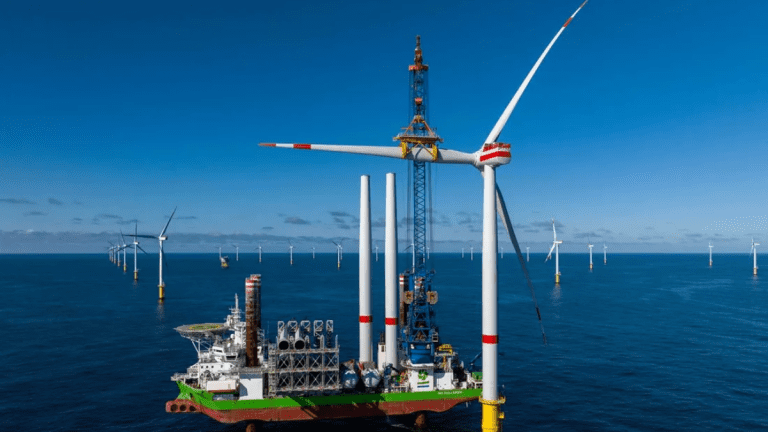
🕒 Last updated on July 26, 2025
In a surprising decision, the U.S. Department of Energy (DoE) has cancelled a $4.9 billion loan guarantee for the Grain Belt Express—a massive power line project that was meant to deliver wind energy from the Midwest to states farther east.
A Power Line Promised Big Clean Energy Gains—Now It’s Gone
The line was designed to carry 2.25 gigawatts of power, enough to supply energy to about 1.6 million homes.
The project was a major part of America’s clean energy goals. It was supposed to carry electricity generated from wind farms in states like Kansas and Missouri to areas in the eastern U.S. that need more power. Many had hoped it would help lower electricity costs and reduce reliance on coal and gas. However, that plan has been abandoned.
The Department of Energy has said the loan was rushed and lacked proper review. Officials claimed the approval process happened too quickly, especially in the final weeks of the previous administration. They also suggested that important steps like environmental checks and financial reviews were skipped or not completed properly.
The Grain Belt Express’s future is now uncertain as a result of the loan guarantee being canceled. This has sparked outrage among clean energy supporters, who believe the move is part of a broader effort to block renewable energy development in the country.
🌍 India declares green war on dirty finance—regulator demands climate risk stress tests from banks
What Was the Grain Belt Express, and Why Did It Matter?
The Grain Belt Express was planned as an 800-mile-long power transmission line. It would have stretched from Kansas through Missouri and Illinois, ending in Indiana. Its job was to carry clean wind energy across the country, from areas where it’s produced in large quantities to cities where it’s needed most.
Supporters of the project said it could have helped modernize the U.S. power grid. Many parts of the grid today are old and not built to handle large amounts of wind or solar power. The Grain Belt Express promised to be part of the solution by creating a path for green energy to flow freely between states.
Another big selling point was job creation. Developers said the project could have created thousands of construction jobs and supported clean energy businesses in the region. It was also expected to lower electricity bills in many areas, thanks to cheaper wind energy.
But now, all those benefits are in doubt. Without the federal loan guarantee, the project may not be able to move forward. Building such a long and complex power line costs a lot of money, and private investors may not be willing to take the risk without government support.
Some critics have called the cancellation a “green new scam,” arguing that the government is no longer serious about fighting climate change. Others believe it’s a sign of growing political resistance to renewable energy, especially in regions that still depend on coal, oil, and gas.
🧱 Finland builds world’s largest sand battery — and it’s heating homes without oil or pollution
Political Tensions and the Future of Clean Energy Projects
The cancellation of the loan is being seen by many as part of a larger trend. Over the past year, several clean energy projects have faced delays, cancellations, or growing opposition. Many of these setbacks come just as the demand for power is rising, especially during hot summers and extreme weather events.
In this case, the Department of Energy has claimed that the loan process was flawed. They say the paperwork was pushed through too quickly and that key federal rules were ignored. However, those who supported the project argue that the sudden reversal is politically motivated and harms the country’s energy future.
Wind energy was only one aspect of the Grain Belt Express. It was about building new infrastructure that could support America’s future power needs. As more people buy electric vehicles, air conditioning becomes more common, and factories grow, the demand for electricity keeps rising. And many experts agree that clean sources like wind and solar are the best way to meet that demand.
Now, with the cancellation of the $4.9 billion loan, those plans are at risk. The power line was one of the biggest and most ambitious clean energy transmission projects in the country. Its end is a major blow to the wind energy sector and to states that hoped to benefit from the electricity it would have delivered.
📢 Trump weaponizes AI to crush reliance on India, China — ‘Put America first or pay’
For now, it’s unclear what will happen next. The developers of the Grain Belt Express have not yet announced their next steps. Some are still hoping the project can move forward with other forms of financing. But without federal backing, it faces an uphill battle.
Meanwhile, clean energy supporters worry that other major projects may meet the same fate. If political pressure continues to grow and if government support fades, the path toward a cleaner power grid could become much harder. The cancellation of the Grain Belt Express is a clear example of how quickly things can change—and how fragile progress can be.